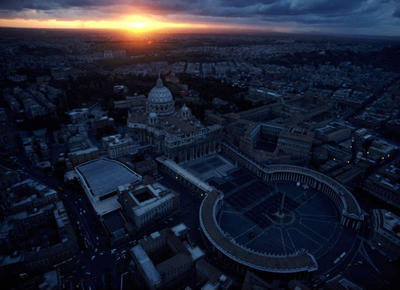 Newsweek comenta sobre los primeros meses del reinado de Benedicto XVI.
Newsweek comenta sobre los primeros meses del reinado de Benedicto XVI.Nos presenta a un Papa contradictorio: un intelectual que tiene miedo que la gente piense, un cristiano que le teme al amor irrestricto de Cristo, un europeo que no entiende a Europa...
"Vatican scholars who've studied Benedict's approach see him walking a careful line between asserting moral authority and mixing it up in national politics. But outsiders have found that a distinction hard to discern. His first formal state visit to Italian President Carlo Azeglio Ciampi came at a very sensitive moment. Only days before, Italy's cardinals had campaigned successfully against liberalizing the country's policies on human-fertility practices. They asked the public to abstain, thus annulling any result. Ciampi had made a point, himself, of voting. Now, as Ciampi received Benedict, the pontiff insisted on the church's duty to take a stand. It must concern itself with "the family founded on marriage" and the "defense of human life from conception to its natural end," he said. Ciampi, clearly taken aback, tried to assert the "necessary distinction" between church and state.
What you saw in Italy was in a sense the first skirmish in what will be a much broader cultural conflict," says Vatican commentator John Allen. "This is going to be a robust and no-holds-barred papacy that makes the argument that there are certain objective truths about the human person that have to have consequences in public policy and civil law." But there are also some apparent political calculations. In Spain, where there was no chance the church could defeat the government's legalization of same-sex marriage, Pope Benedict never put his personal prestige on the line to support the local bishops' campaign against the law.
Benedict is wise to pick his battles. The 78-year-old Bavarian-born pontiff, who was the Vatican's guardian of doctrinal purity for 23 years, is at heart more a retiring intellectual than a rousing campaigner. He knows what he's up against. As the journal of theology Concilium wrote last year, the roots of Christian culture in Europe are tangled around some very ugly history, including centuries of religious wars and, more recently, the Holocaust: "Even though full-blown Nazism was an atheistic and anti-Christian ideology, the fact remains that European nations, East and West, colluded in the destruction of their Jewish citizenry." Given such history, it's not altogether surprising that, as Concilium put it, "Christianity is for most Europeans a part of Europe's distant past and not much more."
It's telling that the final draft of the European constitution left God out of its preamble. According to the most recent European Values Study, just 21 percent of Europeans say religion is very important to them. A Gallup poll last year found that on average only about 15 percent of Europe's people attend a place of worship once a week, compared with 44 percent of Americans.
Moreover, as the church under Benedict tries to assert itself in the midst of raging political debates over specific questions like stem-cell research, abortion, the role of religion in education, gay marriage—even the teaching of evolution—some of those who claim to embrace Benedict's teachings already risk caricaturing them. After the horrific bombings in London on July 7, for instance, one of Benedict's aides released a statement saying the attacks were "against Christianity." The phrase was quickly corrected to "against humanity." Benedict himself spoke to reporters to make clear he thought the intent of the terrorists "was far more general."... "
Mientras Ratzinger divide aún más a la Iglesia, no es de sorprender que el sol se ponga sobre Roma. Pero saldrá en otras partes...



No hay comentarios.:
Publicar un comentario